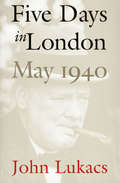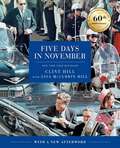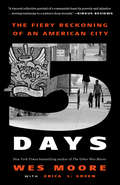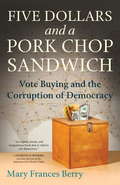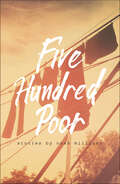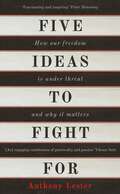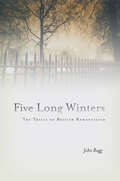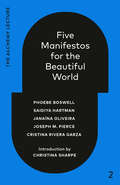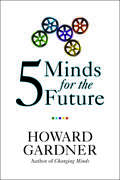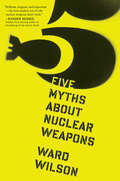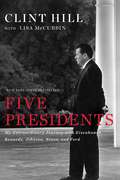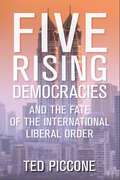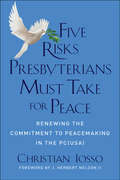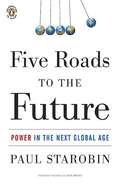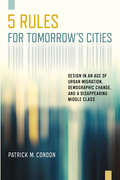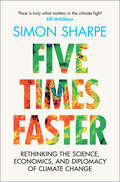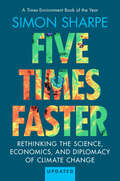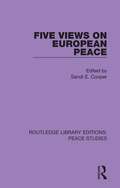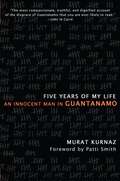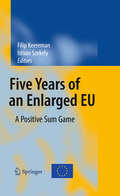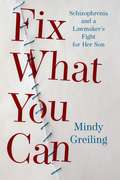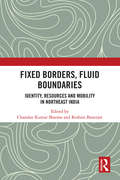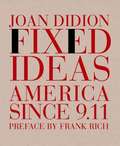- Table View
- List View
Five Days in London, May 1940: May 1940
by John LukacsA &“gripping [and] splendidly readable&” portrait of the battle within the British War Cabinet—and Churchill&’s eventual victory—as Hitler&’s shadow loomed (The Boston Globe). From May 24 to May 28, 1940, members of Britain&’s War Cabinet debated whether to negotiate with Hitler or to continue what became known as the Second World War. In this magisterial work, John Lukacs takes us hour by hour into the critical events at 10 Downing Street, where Winston Churchill and his cabinet painfully considered their responsibilities. With the unfolding of the disaster at Dunkirk, and Churchill being in office for just two weeks and treated with derision by many, he did not have an easy time making his case—but the people of Britain were increasingly on his side, and he would prevail. This compelling narrative, a Washington Post bestseller, is the first to convey the drama and world-changing importance of those days. &“[A] fascinating work of historical reconstruction.&”—The Wall Street Journal &“Eminent historian Lukacs delivers the crown jewel to his long and distinguished career.&”—Publishers Weekly (starred review) &“A must for every World War II buff.&”—Cleveland Plain Dealer &“Superb…can be compared to such classics as Hugh Trevor-Roper&’s The Last Days of Hitler and Barbara Tuchman&’s The Guns of August.&”—Harper&’s Magazine
Five Days in November
by Clint Hill Lisa McCubbin HillSecret Service agent Clint Hill reveals the stories behind the iconic images of the five tragic days surrounding President John F. Kennedy&’s assassination in this 60th anniversary edition of the New York Times bestseller.On November 22, 1963, three shots were fired in Dallas, President John F. Kennedy was assassinated, and the world stopped for four days. For an entire generation, it was the end of an age of innocence. That evening, a photo ran on the front pages of newspapers across the world, showing a Secret Service agent jumping on the back of the presidential limousine in a desperate attempt to protect the President and Mrs. Kennedy. That agent was Clint Hill. Now Hill commemorates the sixtieth anniversary of the tragedy with this stunning book containing more than 150 photos, each accompanied by his incomparable insider account of those terrible days. A story that has taken Hill half a century to tell, this is a &“riveting, stunning narrative&” (Herald & Review, Illinois) of personal and historical scope. Besides the unbearable grief of a nation and the monumental consequences of the event, the death of JFK was a personal blow to a man sworn to protect the first family, and who knew, from the moment the shots rang out in Dallas, that nothing would ever be the same.
Five Days: The Fiery Reckoning of an American City
by Wes Moore Erica L. GreenFrom the New York Times bestselling author of The Other Wes Moore, a kaleidoscopic account of five days in the life of a city on the edge, told through eight characters on the front lines of the uprising that overtook Baltimore and riveted the world When Freddie Gray was arrested for possessing an “illegal knife” in April 2015, he was, by eyewitness accounts that video evidence later confirmed, treated “roughly” as police loaded him into a vehicle. <P><P>By the end of his trip in the police van, Gray was in a coma from which he would never recover. In the wake of a long history of police abuse in Baltimore, this killing felt like the final straw—it led to a week of protests, then five days described alternately as a riot or an uprising that set the entire city on edge and caught the nation's attention. Wes Moore is a Rhodes Scholar, bestselling author, decorated combat veteran, former White House fellow, and CEO of Robin Hood, one of the largest anti-poverty nonprofits in the nation. <P><P>While attending Gray’s funeral, he saw every stratum of the city come together: grieving mothers, members of the city’s wealthy elite, activists, and the long-suffering citizens of Baltimore—all looking to comfort one another, but also looking for answers. He knew that when they left the church, these factions would spread out to their own corners, but that the answers they were all looking for could be found only in the city as a whole. <P><P>Moore—along with journalist Erica Green—tells the story of the Baltimore uprising both through his own observations and through the eyes of other Baltimoreans: Partee, a conflicted black captain of the Baltimore Police Department; Jenny, a young white public defender who&’s drawn into the violent center of the uprising herself; Tawanda, a young black woman who’d spent a lonely year protesting the killing of her own brother by police; and John Angelos, scion of the city’s most powerful family and executive vice president of the Baltimore Orioles, who had to make choices of conscience he’d never before confronted. <P><P>Each shifting point of view contributes to an engrossing, cacophonous account of one of the most consequential moments in our recent history, which is also an essential cri de coeur about the deeper causes of the violence and the small seeds of hope planted in its aftermath.
Five Dollars and a Pork Chop Sandwich
by Mary Framces BerryA timely and nonpartisan book on voter manipulation and electoral corruption--and the importance of stimulating voter turnout and participationThough voting rights are fundamental to American democracy, felon disfranchisement, voter identification laws, and hard-to-access polling locations with limited hours are a few of the ways voter turnout is suppressed. These methods of voter suppression are pernicious, but in Five Dollars and a Pork Chop Sandwich, Dr. Mary Frances Berry focuses on forms of corruption including vote buying, vote hauling, the abuse of absentee ballots, and other illegal practices by candidates and their middlemen, often in collusion with local election officials.Vote buying--whether it's for a few dollars, a beer, or a pack of cigarettes--is offered to individual citizens in order to ensure votes for a particular candidate, and Dr. Berry notes it occurs across party lines, with Republicans, Democrats, and independents all participating.Dr. Berry shares the compelling story of Greg Malveaux, former director of Louisiana's Vote Fraud Division, and how this "everyman" tried to clean up elections in a state notorious for corruption. Malveaux discovered virtually every type of electoral fraud during his tenure and saw firsthand how abuses occurred in local communities--from city councils to coroners' offices. In spite of Sisyphean persistence, he found it virtually impossible to challenge the status quo. Dr. Berry reveals how this type of electoral abuse is rampant across the country and includes myriad examples from other states, including Illinois, Texas, Florida, Kentucky, and Mississippi.Voter manipulation is rarely exposed and may be perceived as relatively innocuous, however; Dr. Berry observes that in addition to undermining basic democracy, it also leads to a profound lack of accountability and a total disconnect between politicians and their constituents, and that those in poor and minority communities are the most vulnerable. While reforming campaign finance laws are undeniably important to our democracy, being attuned to issues of structural powerlessness and poverty, and to the cycles that perpetuate them, is no less crucial.In Five Dollars and a Pork Chop Sandwich, Dr. Berry shares specific successful voting strategies that other countries have adopted and urges creativity in rewarding people for voting. She also underscores the continued importance of grassroots education, so that citizens see voting as desirable and empowering--as a tool to help create the kind of environment they deserve.From the Hardcover edition.
Five Hundred Poor: Stories
by Noah Milligan"An honest glimpse at how the other half lives and how the other half dies that should inspire us to try harder."óJared Yates Sexton, author of The People Are Going To Rise Like The Waters Upon Your ShoreFrom acclaimed author, Noah Milligan, comes a short story collection, Five Hundred Poor. The title comes from Adam Smithís The Wealth of Nations, ìWherever there is great property there is great inequality. For one very rich man there must be at least five hundred poor, and the affluence of the few supposes the indigence of the many. The affluence of the rich excites the indignation of the poor, who are often both driven by want, and prompted by envy, to invade his possessions.îThese are ten stories of those five hundred poor, the jaded, the disillusioned, and the disenfranchised."Noah Milligan writes about Oklahoma in such an uncanny, dark, compelling way."óBrandon Hobson, author of Where The Dead Sit TalkingNoah Milligan's other books:An Elegant TheoryInto Captivity They Will Go.
Five Ideas to Fight For: How Our Freedom Is Under Threat and Why It Matters
by Anthony LesterHuman rights, equality, freedom of expression, privacy, the rule of law. These five ideas are vitally important to the way of life we enjoy today. The battle to establish them in law was long and difficult - as recently as 1970 two-hundred-thousand British Asians were almost stripped of their British citizenship as a result of racist legislation.From assaults on the EU Human Rights Act to the revelations about the NSA and GCHQ brought to light by Edward Snowden, our civil liberties are now under threat in ways they never have been before. Leading human rights lawyer Lord Anthony Lester provides an insider account of how political and legal reforms were achieved and demonstrates why we must act now to ensure they survive the next few decades.
Five Long Winters: The Trials of British Romanticism
by John BuggThis book claims that the British governments repression of the 1790s rivals the French Revolution as the most important historical event for our understanding the development of Romantic literature. Romanticism has long been associated with both rebellion and escapism, and much Romantic historicism traces an arc from the outburst of democratic energy in British culture triggered by the French Revolution to a dwindling of enthusiasm a bit later in the 1790s, when things in France turned violent. Writers such as Wordsworth and Coleridge can then be seen as "apostates" who turned from radical politics to a poetics of transcendence. Bugg argues instead for a poetics of silence, and his book is set against the backdrop of the so-called Gagging Acts and other legislation of William Pitt, which in literature manifests itself stylistically as silence, stuttering, fragmentation, and encoding. Mining archives of unpublished documents, including manuscripts, diaries, and letters, where authors were more candid, as well as rereading the work of both major and minor figures, a number of whom were subject to prison sentences, "Five Long Winters" offers a new way of approaching the literature of the Romantic era.
Five Manifestos for the Beautiful World: The Alchemy Lecture 2023 (The Alchemy Lecture)
by Saidiya Hartman Cristina Rivera Garza Joseph M. Pierce Phoebe Boswell Janaína OliveiraFive Alchemists. One book. A constellation of ideas.The second annual Alchemy Lecture was presented in November 2023 at York University to a sold out in-person audience and nearly one thousand live online viewers. Moderated by Dr. Christina Sharpe, the Alchemists—agile thinkers and practitioners working across a range of disciplines and geographies—convened to discuss their radical visions of the beautiful world, and the manifestos that may help to guide us there. Their treatises have been captured and luminously expanded in the pages of this book.Cherokee Nation citizen and professor Joseph M. Pierce asserts that &“[f]or this decolonial future to become possible, the guiding force must no longer be capital but relations.&” Informed by her practice of &“curation as care,&” Brazilian film curator Janaína Oliveira evokes music and movement as a means toward this relationality: &“it's almost by falling that you live. . . . The beautiful world dances the stumbles. The beautiful world dances dancing.&” Kenyan-British visual artist Phoebe Boswell uses the space of a virtual gallery to ask, &“If we burn down the institution, what happens next? Do we trust ourselves to know?&” and gestures toward the possibility of this &“as yet unlived, unexperienced thing.&” Professor and MacArthur fellow Saidiya Hartman asks us to consider our capacity to burn, stating that &“[P]ragmatism yields a profound tolerance of the unlivable.&” And Mexican-American author Cristina Rivera Garza gives us the language of the future in the subjunctive, which &“lays the groundwork for the irruption. . . . The subjunctive is the smuggler who crosses the border of the future bearing unknown cargo.&”Each Alchemist is intimately concerned with the shape of this cargo and our ability to bear its weight, together. Through these expansive, transformative essays, new ways of being are threaded and proposed, illuminating our path towards this possible beautiful world.
Five Minds for the Future
by Howard GardnerWe live in a time of relentless change. The only thing that?s certain is that new challenges and opportunities will emerge that are virtually unimaginable today. How can we know which skills will be required to succeed?In Five Minds for the Future, bestselling author Howard Gardner shows how we will each need to master "five minds" that the fast-paced future will demand:· The disciplined mind, to learn at least one profession, as well as the major thinking (science, math, history, etc.) behind it· The synthesizing mind, to organize the massive amounts of information and communicate effectively to others· The creating mind, to revel in unasked questions - and uncover new phenomena and insightful apt answers· The respectful mind, to appreciate the differences between human beings - and understand and work with all persons· The ethical mind, to fulfill one's responsibilities as both a worker and a citizenWithout these "minds," we risk being overwhelmed by information, unable to succeed in the workplace, and incapable of the judgment needed to thrive both personally and professionally.Complete with a substantial new introduction, Five Minds for the Future provides valuable tools for those looking ahead to the next generation of leaders - and for all of us striving to excel in a complex world.Howard Gardner-cited by Foreign Policy magazine as one of the one hundred most influential public intellectuals in the world, and a MacArthur Fellowship recipient-is the Hobbs Professor of Cognition and Education at the Harvard Graduate School of Education.
Five Myths About Nuclear Weapons
by Ward WilsonAn explosive rethinking of the power and purpose of nuclear weapons—and a call for radical action Nuclear weapons have always been a serious but seemingly insoluble problem: while they&’re obviously dangerous, they are also, apparently, necessary. This groundbreaking study shows why five central arguments promoting nuclear weapons are, in essence, myths. It is a myth: • that nuclear weapons necessarily shock and awe opponents, including Japan at the end of World War II • that nuclear deterrence is reliable in a crisis • that destruction wins wars • that the bomb has kept the peace for sixty-five years • and that we can&’t put the nuclear genie back in the bottle Drawing on new information and the latest historical research, Wilson poses a fundamental challenge to the myths on which nuclear weapons policy is currently built. Using pragmatic arguments and an unemotional, clear-eyed insistence on the truth, he arrives at a surprising conclusion: nuclear weapons are enormously dangerous, but don&’t appear to be terribly useful. In that case, he asks, why would we want to keep them? This book will be widely read and discussed by everyone who cares about war, peace, foreign policy, and security in the twenty-first century.
Five Presidents: My Extraordinary Journey with Eisenhower, Kennedy, Johnson, Nixon, and Ford
by Clint Hill Lisa Mccubbin<P>A rare and fascinating portrait of the American presidency from the #1 New York Times bestselling author of Mrs. Kennedy and Me and Five Days in November. <P>Secret Service agent Clint Hill brings history intimately and vividly to life as he reflects on his seventeen years protecting the most powerful office in the nation. <P>Hill walked alongside Presidents Dwight D. Eisenhower, John F. Kennedy, Lyndon B. Johnson, Richard M. Nixon, and Gerald R. Ford, seeing them through a long, tumultuous era--the Cold War; the Cuban Missile Crisis; the assassinations of John F. Kennedy, Martin Luther King, Jr., and Robert F. Kennedy; the Vietnam War; Watergate; and the resignations of Spiro Agnew and Richard M. Nixon. <P>Some of his stunning, never-before-revealed anecdotes include: -Eisenhower's reaction at Russian Prime Minister Khrushchev's refusal to talk following the U-2 incident -The torture of watching himself in the Zapruder film in a Secret Service training -Johnson's virtual imprisonment in the White House during violent anti-Vietnam protests -His decision to place White House files under protection after a midnight phone call about Watergate -The challenges of protecting Ford after he pardoned Nixon <P>With a unique insider's perspective, Hill sheds new light on the character and personality of these five presidents, revealing their humanity in the face of grave decisions. <P><b>A New York Times Bestseller</b>
Five Rising Democracies
by Ted PicconeShifting power balances in the world are shaking the foundations of the liberal international order and revealing new fault lines at the intersection of human rights and international security. Will these new global trends help or hinder the world's long struggle for human rights and democracy? The answer depends on the role of five rising democracies-India, Brazil, South Africa, Turkey, and Indonesia-as both examples and supporters of liberal ideas and practices.Ted Piccone analyzes the transitions of these five democracies as their stars rise on the international stage. While they offer important and mainly positive examples of the compatibility of political liberties, economic growth, and human development, their foreign policies swing between interest-based strategic autonomy and a principled concern for democratic progress and human rights. In a multipolar world, the fate of the liberal international order depends on how they reconcile these tendencies.
Five Risks Presbyterians Must Take for Peace: Renewing The Commitment To Peacemaking In The Pc(usa)
by Christian IossoBelieving peacemaking to be an inherent part of discipleship, Presbyterians have taken many valiant stands for peace throughout our history. However, changing global realities, political and military actions, and new weapons of war have made the world less safe than ever. The church must reconsider how to be faithful peacemakers in this changing reality. <P><P>The Presbyterian Church recently spent six years reflecting on peacemaking. Building on past policy documents, people at all levels of the church studied and discussed what peacemaking policies needed to be modified given the world context today. The 2016 PC(USA) General Assembly affirmed five affirmations the church must make to fulfill its peacemaking calling. Those affirmations become risks when truly taken, because their message collides with the demands for continued sacrifice by the powers that be. In this timely resource, author Christian Iosso explains what the five risks are, how they differ from previous positions, and what taking each risk might look like today. <P><P>Ideal for individual or group study, this important resource includes questions for reflection and discussion.
Five Roads to the Future: Power in the Next Global Age
by Paul StarobinFarsighted and fascinating predictions for a new world order <P> Veteran international correspondent Paul Starobin masterfully mixes fresh reportage with rigorous historical analysis to envision a world in which the United States is no longer the dominant superpower. Following an insightful study of America's global ascendency, Starobin provides the reasons for America's waning influence and explores five possible paths for the future, each of which is already in the making: A global chaos that could be dark or happy; a multipolar order of nation-states; a global Chinese imperium; an age of global city-states; or a universal civilization leading to world government. Starobin's tone is somber but in the end hopeful-the world after America need not be a disaster for America, and may even be liberating.
Five Rules for Tomorrow's Cities: Design in an Age of Urban Migration, Demographic Change, and a Disappearing Middle Class
by Patrick M. CondonAs urban designers respond to the critical issue of climate change they must also address three cresting cultural waves: the worldwide rural-to-urban migration; the collapse of global fertility rates; and the disappearance of the middle class. In Five Rules for Tomorrow's Cities, planning and design expert Patrick Condon offers five rules to help urban designers assimilate these interconnected changes into their work: (1) See the City as a System; (2) Recognize Patterns in the Urban Environment; (3) Apply Lighter, Greener, Smarter Infrastructure; (4) Strengthen Social and Economic Urban Resilience; and (5) Adapt to Shifts in Jobs, Retail, and Wages. Five Rules for Tomorrow's Cities provides grounded and financially feasible design examples for tomorrow's sustainable cities, and the design tools needed to achieve them.
Five Things to Know about the Australian Constitution
by Helen IrvingIn this excellent new book, Helen Irving delves into the mystery that is the Australian constitution by discussing the major national debates of recent years. Many people want to understand and take part in the debate about constitutional issues but they face a significant hurdle: the constitution is almost unreadable. It does not mean what it says, and nor does it say what it means. There are many myths in circulation about what the constitution says and as many assumptions about what it does. Helen Irving, one of this country's foremost constitutional experts, puts various constitutional confusions to rest, and invites a general audience into an understanding of the issues that were once reserved for experts.
Five Times Faster: Rethinking the Science, Economics, and Diplomacy of Climate Change
by Simon SharpeWe need to act five times faster to avoid dangerous climate change. As Greenland melts, Australia burns, and greenhouse gas emissions continue to rise, we think we know who the villains are: oil companies, consumerism, weak political leaders. But what if the real blocks to progress are the ideas and institutions that are supposed to be helping us? Five Times Faster is an inside story from Simon Sharpe, who has spent ten years at the forefront of climate change policy and diplomacy. In our fight to avoid dangerous climate change, science is pulling its punches, diplomacy is picking the wrong battles, and economics has been fighting for the other side. This provocative and engaging book sets out how we should rethink our strategies and reorganise our efforts in the fields of science, economics, and diplomacy, so that we can act fast enough to stay safe.
Five Times Faster: Rethinking the Science, Economics, and Diplomacy of Climate Change – Updated Edition
by Simon SharpeWe need to act five times faster to avoid dangerous climate change. This is an inside story from Simon Sharpe, who has spent ten years at the forefront of climate change policy and diplomacy. In our fight to avoid dangerous climate change, science is pulling its punches, diplomacy is picking the wrong battles, and economics has been fighting for the other side. This provocative and engaging book sets out how we should rethink our strategies and reorganise our efforts in the fields of science, economics, and diplomacy, so that we can act fast enough to stay safe. This edition has been brought up-to-date throughout, and includes a new chapter on how international cooperation on climate change can be reconciled with economic and geopolitical competition. It also includes a response to the question the book has most often provoked: 'How can I help?'
Five Views on European Peace (Routledge Library Editions: Peace Studies)
by Sandi E. CooperThe years of the French Revolution and the Napoleonic conquest of Europe revealed an undeniable conjunction between international war and internal revolution, a combination which both repelled and attracted contemporary and successive generations. Represented in this volume, originally published with a new introduction in 1972, are excerpts from five eminent Europeans who lived, wrote and worked in the shadow of that awesome reality. Though their attitudes toward war and revolution differ sharply, the observations of Saint-Simon, Gentz Hugo, Mazzini and Considerant reflect the responses of a wide range of committed and thoughtful Europeans.
Five Years After: European Union Membership and Macro-Financial Stability in the New Member States
by Wim Fonteyne Martin ČihákA report from the International Monetary Fund.
Five Years of My Life: An Innocent Man in Guantanamo
by Murat KurnazIn October 2001, nineteen-year-old Murat Kurnaz traveled to Pakistan to visit a madrassa. During a security check a few weeks after his arrival, he was arrested without explanation and for a bounty of $3,000, the Pakistani police sold him to U.S. forces. He was first taken to Kandahar, Afghanistan, where he was severely mistreated, and then two months later he was flown to Guantanamo as Prisoner #61. For more than 1,600 days, he was tortured and lived through hell. He was kept in a cage and endured daily interrogations, solitary confinement, and sleep deprivation. Finally, in August 2006, Kurnaz was released, with acknowledgment of his innocence. Told with lucidity, accuracy, and wisdom, Kurnaz's story is both sobering and poignant--an important testimony about our turbulent times when innocent people get caught in the crossfire of the war on terrorism.
Five Years of an Enlarged EU
by Filip Keereman Istvan SzekelyThis book analyzes the economic performance of the EU in the first five years after its largest expansion in 2004. Accession and integration were expected to foster growth and convergence among the new Member States through intensified trade, foreign direct investment, financial deepening and the adoption of the EU's institutional framework. With the benefit of five years experience, this book brings together experts from academia and think-tanks to assess the driving forces of economic growth and real convergence. The question whether the EU has made a difference in terms of growth is studied thoroughly from various angles, including that of country-specific and sector-specific analysis. It is shown that while the enlargement has been a success story overall, growth and catching-up cannot be taken for granted and the importance of economic policy remains undiminished.
Fix What You Can: Schizophrenia and a Lawmaker's Fight for Her Son
by Mindy GreilingOne mother&’s fight to support her son and change a broken system In his early twenties, Mindy Greiling&’s son, Jim, was diagnosed with schizoaffective disorder after experiencing delusions that demanded he kill his mother. At the time, and for more than a decade after, Greiling was a Minnesota state legislator who struggled, along with her husband, to navigate and improve the state&’s inadequate mental health system. Fix What You Can is an illuminating and frank account of caring for a person with a mental illness, told by a parent and advocate. Greiling describes challenges shared by many families, ranging from the practical (medication compliance, housing, employment) to the heartbreaking—suicide attempts, victimization, and illicit drug use. Greiling confronts the reality that some people with serious mental illness may be dangerous and reminds us that medication works—if taken. The book chronicles her efforts to pass legislation to address problems in the mental health system, including obstacles to parental access to information and insufficient funding for care and research. It also recounts Greiling&’s painful memories of her grandmother, who was confined in an institution for twenty-three years—recollections that strengthen her determination that Jim&’s treatment be more humane. Written with her son&’s cooperation, Fix What You Can offers hard-won perspective, practical advice, and useful resources through a brave and personal story that takes the long view of what success means when coping with mental illness.
Fixed Borders, Fluid Boundaries: Identity, Resources and Mobility in Northeast India
by Reshmi Banerjee Chandan Kumar SharmaThis book provides an understanding of the challenges in Northeast India in terms of the nature of flows and ruptures in the daily lives of people. It brings together multiple and interconnected issues of identity, development, environment, migration, land alienation and policy impacts to the forefront. Northeast India’s history is affected both by internal dynamic processes, as are its linkages with adjoining countries, marked by a fluid movement of people and goods across porous borders. The book explores how the region has emerged as a resource frontier for the global markets, yet its resource mobilization has led to disparity within the region. The volume discusses key themes concerning the region such as the processes of development and people’s resistance; underdevelopment in the peripheral areas; resource flow and conflict; community response and local agency; state and customary practices; politics of land and citizenship; development-induced dispossession; human mobility, immigration and conflict; the notion of "outsiders"; inter-state border conflict; and spatial connections. Rich in empirical data, the volume will be relevant and useful for students and researchers of development studies, Northeast India studies, sociology, political science, border and migration studies, public policy, peace and conflict studies, as well as practitioners and policymakers.
Fixed Ideas: America Since 9.11
by Joan DidionAuthor describes how, since September 11, 2001, there has been a determined effort by the administration to promote an imperial America, a "New Unilateralism" and how, in many parts of America, there is now a disconnect between the government and its citizens.
